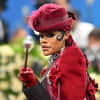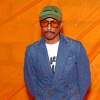Japanese designer Nigo (born Tomoaki Nagao) is an icon of the kind of playful, colorful, ahead-of-the-curve street style that's now synonymous with his country's take on fashion—with his groundbreaking Tokyo brand A Bathing Ape, which he started in 1993, he formed a famous creative partnership with Pharrell that made the entire world, including Kanye and Jay Z, covet the often sold out Bapestas. After 20 years at its helm, he left Bape this year to focus on other projects, the first results of which are a partnership with mega-retailer Uniqlo on their massively popular UT line of fun T-shirts and sweats. The aesthetic is much more toned down than the camos and candy-colored prints that BAPE was famous for, though his signature love for Americana cartoons is everywhere in the Snoopy and Minnie Mouse graphics that festoon the line of tees. Everything will hit stores in Spring, and we caught up with Nigo at the collaboration's New York launch to ask him, through a translator, about its inspirations and what's popping in Japan at the moment.
You’re famous clothes that are super exclusive and sell out right away. What was appealing about doing something that everybody can buy? Being exclusive back then was the nature of the beast in a way, but we always had ambitions to take it as far as possible, you know, start small and grow and work with your strengths. So, in terms of ambition, it wasn’t like a big jump to switch to Uniqlo, but what was interesting was working with a brand with global reach. It’s a challenge to have it translate to everyone—it has to appeal to a much wider base of people, which is something I’ve never really had to worry about.
How do you sort of work through the challenge of appealing to such a big audience? There’s an existing team from Uniqlo and I’m directing. They’ve been doing it for a while, so they have their own impression of kind of what works. But what I want to add is, like okay, say we’re going to do a Star Wars t-shirt, lets do something within Star Wars that somebody who really cares about Star Wars and knows a lot about it is going to recognize. There’s some reality to it, it’s not just like, Oh okay this sells. There’s a reason behind it—I want to add that as much as possible.
There’s a lot of icons of Americana in the collection, which you’ve always loved. How’d you get so into American cartoons and pop culture? My base is Americana, but also in a weird way, I received quite a lot of those influences via a strange route, like through a London connection or something. And by the time it arrives in Japan, it’s got its own little twist to it. But it’s just always been what I’ve been interested in—Snoopy is a standard, basic for ages.
Streetwear has become such a big force in fashion recently, a trend you were definitely ahead of. What your’s take on this new generation of streetwear? Again, it’s like a generational shift. When I started out, there was really no respect for that stuff and even to the level where it actually dress codes: like, you can’t come in here wearing jeans and a t-shirt. That kind of thing has really vanished from the world. So, I guess for a younger generation of people that have grown up in a world where that wasn’t the case, it’s not a big deal for them, it’s not even a factor.
This collection is so different than BAPE—how do you see the world dressing differently than they did when you first started in fashion back in 1993? A baby born back when I started is now 20 years old, but weirdly, fashion goes in these cycles, and I actually feel like there’s a lot happening now which is reflects 1993. So it feels like a lot of things are coming back right now because of that generational cycle.
Why’d you leave BAPE? I don’t really care about that—I just think about the future.
I look to Japan as a place where so many trends start—what’s happening there now that we’ll all be into in two years or so? Tokyo’s become quite insular, and a lot of what’s happening is not going to translate outside, so it’s hard to see something that’s going to be. Maybe next year.
You’re famous for your connection to music. What kind of music inspires you now? I have to talk about Pharrell, because I’m still so influenced by him. I’m really pleased to see his success recently. And I thought that the 24 hour video was cool. But I’ve also been listening to like weird Japanese idol groups, kind of strange—not Kyary Pamyu Pamyu, but weirder sort of groups. There’s one group – they’re called Brand New Idol Society. It’s pretty weird.


